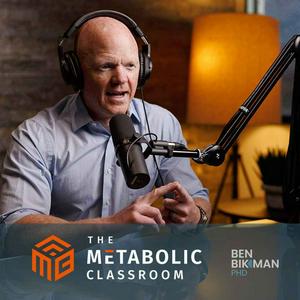Natural Ways to Boost GLP-1
For this week’s Metabolic Classroom lecture, Dr. Bikman focuses on natural ways to boost GLP-1 (Glucagon-Like Peptide-1), a powerful gut hormone involved in appetite control, blood sugar regulation, and metabolic health.Ben begins by explaining that GLP-1 is secreted in response to food intake, influencing glucagon suppression, slowing gastric emptying, and activating satiety centers in the brain. However, research shows that individuals with obesity tend to have a blunted GLP-1 response, particularly after consuming carbohydrates. This means that people with obesity may not experience the same level of fullness and appetite regulation, which can contribute to overeating.Dr. Bikman then discusses concerns with GLP-1 receptor agonist medications, such as Ozempic and Wegovy. While they effectively promote weight loss, they also come with significant downsides, including loss of lean mass (up to 40% of total weight lost), increased mental health risks (depression, anxiety, and suicidal thoughts), and a return of sweet cravings over time. Additionally, 70% of people discontinue these drugs within two years, often regaining weight—primarily as fat—due to muscle loss during treatment.He then presents natural methods to enhance GLP-1 production without drugs. His lab at BYU found that Yerba Mate significantly increases GLP-1 by 40-50%, likely due to its ferulic acid content and bitter taste receptors that also reduce sweet cravings. Allulose, a rare sugar, has also been shown to stimulate GLP-1 and improve glucose control, even in individuals with type 1 diabetes. Other natural boosters include a low-carbohydrate, protein-rich diet, which triples GLP-1 levels compared to a low-fat diet, collagen peptides, which enhance GLP-1 secretion and insulin sensitivity, and quality sleep, since poor sleep is linked to impaired GLP-1 signaling and increased hunger.Dr. Bikman concludes by emphasizing that leveraging diet and lifestyle changes is the most effective and sustainable way to improve GLP-1 levels, regulate appetite, and support long-term metabolic health. While GLP-1 medications may serve a purpose, particularly for those struggling with carbohydrate cravings, they come with risks that should not be ignored. Instead, strategies such as Yerba Mate, allulose, low-carb diets, collagen peptides, and better sleep can provide natural, lasting benefits without side effects.Show Notes/References:For complete show notes and references referred to in this episode, we invite you to become a Ben Bikman Insider subscriber. As a subscriber, you’ll enjoy real-time, livestream Metabolic Classroom access which includes live Q&A with Ben, ad-free Metabolic Classroom Podcast episodes, show notes and references, Ben’s Research Reviews Podcast, and a searchable archive that includes all Metabolic Classroom episodes and Research Reviews. Learn more: https://www.benbikman.com Hosted on Acast. See acast.com/privacy for more information.

